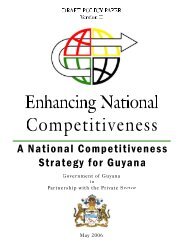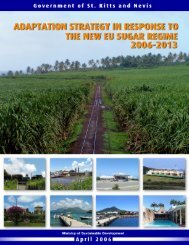Business Removing
Doing Business in 2005 -- Removing Obstacles to Growth
Doing Business in 2005 -- Removing Obstacles to Growth
- No tags were found...
You also want an ePaper? Increase the reach of your titles
YUMPU automatically turns print PDFs into web optimized ePapers that Google loves.
22 DOING BUSINESS IN 2005<br />
Witness the work of the Centro de Formalidades de<br />
Empresa in Portugal. Ten such centers have opened in<br />
Portugal since 1998, at the initiative of the Portuguese<br />
Entrepreneurs’ Association. All company registration procedures<br />
are performed here in only 3 visits—previously<br />
it took 11. Thirty-seven other countries have single access<br />
points, including Algeria, Austria, Estonia, Finland,<br />
Israel, Jamaica, Morocco, Romania, Thailand and the<br />
United Kingdom. These countries take less than half the<br />
time of those without single access points.<br />
Get out of the courts<br />
A second group of reformers, including Bosnia and<br />
Herzegovina and Romania, eliminated the need for mandatory<br />
use of both notaries and judges. Romania made<br />
optional the use of notaries in business registration.<br />
Bosnia and Herzegovina is in the midst of implementing<br />
reform that will make registration an administrative<br />
process, without resorting to the courts. There remain 16<br />
countries—mostly transition countries—where the use<br />
of notaries is still mandatory even though the registration<br />
process involves judges. Slovakia reformed last year<br />
to give incorporation cases to court clerks, not judges.<br />
Notaries perform a simple verification service—<br />
such as certifying that minimum capital has been deposited<br />
in the Republic of Congo or verifying the<br />
founder’s signatures in Hungary—which could easily be<br />
handled by the municipal official or court clerk already<br />
involved in registration. And they typically cost a lot. No<br />
wonder that survey respondents in Albania, Bosnia and<br />
Herzegovina, Bulgaria, Croatia, Estonia, Hungary, Latvia<br />
and Macedonia say that notaries add no value to the incorporation<br />
process.<br />
The countries that have most improved the ease of<br />
business start-up have done so by eliminating the need<br />
for judges. Company registration is an administrative<br />
process. Judges can be freed to focus on commercial disputes.<br />
A recent example is Italy, which until 1998 had the<br />
most cumbersome regulation of any European economy,<br />
with the process taking 4 months. Registration was taken<br />
out of the courts, saving 3 months. Further reforms last<br />
year reduced the time to only 13 days. Several Latin<br />
American countries, including Chile, Honduras and<br />
Nicaragua, have taken registration out of the hands of<br />
judges as well. 10 Serbia and Montenegro adopted legislation<br />
to do so in May 2004. The benefits are large: entrepreneurs<br />
in countries where registration is a judicial<br />
process spend 14 more days to start a business.<br />
Make registration electronic<br />
In public administration, technology can create a unified<br />
database of business information for sharing across municipal<br />
offices and government agencies. And the Internet<br />
can provide information to would-be entrepreneurs,<br />
such as details on procedures, fee schedules and the<br />
working hours of the relevant agencies.<br />
With some simple legislation to allow electronic signatures,<br />
the Internet can also be used to file business registrations,<br />
as in Australia, Belgium, Canada, Singapore and<br />
the United States—but also Moldova and Vietnam. Almost<br />
half the sample countries have such laws, and a dozen others<br />
have draft laws in parliament. Doing so cuts time—by<br />
more than 50% on average (figure 3.5). Paper registration<br />
remains available for those without Internet access.<br />
FIGURE 3.5<br />
Electronic registration and silent consent can shorten start-up time<br />
Average change in time for business start-up<br />
Source: Doing <strong>Business</strong> database.<br />
Time without electronic registration<br />
With online<br />
services<br />
–21 days<br />
With electronic<br />
database<br />
–23 days<br />
With electronic<br />
database and<br />
online services<br />
–30 days<br />
Time without limit<br />
or silent consent<br />
A “Silence is Consent” rule<br />
imposes a deadline after which<br />
a business is automatically<br />
considered registered.<br />
+19 days<br />
With time limit<br />
but no silent consent<br />
Time limits alone are<br />
associated with increased<br />
registration time.<br />
With time<br />
limit and<br />
silent consent<br />
–28 days

















